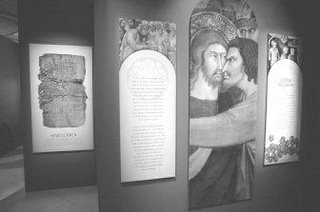
I used to be into the idea of the gnostics. Somewhere along the way I just dropped the interest because it was simply too obscure.
So it's quite interesting to see an article covering the Gnostics.
The Gospel -- literally "good news" -- of Judas was originally written in Greek about 140 years after Jesus and Judas died. The current manuscript is a copy of the original text translated into the Coptic language by a scribe in a group known as the Gnostics.As far as I can tell, the Gnostics were really into the notion of 'I deny reality'.
Extensive analysis of the paper, ink, writing style and text indicate that the copy was made about A.D. 300, according to Terry Garcia of the National Geographic Society.
The Gnostics were a sect "that emphasized knowledge -- gnosis -- but not the kind we think of today," said Bible scholar Gregor Wurst of the University of Augsburg in Germany.
They were interested in the spiritual knowledge of God and "the essential oneness of the inner self with God."
They considered the world a creation of lesser, inferior gods who imprisoned the inner self in a material body, a prison from which they hoped to escape. The Gospel of Judas clearly reflects this belief, which is in stark contrast to the version of Judas presented in the Bible.
"He's the good guy in this portrayal," said Bart Ehrman, a religion professor at the University of North Carolina at Chapel Hill. "He's the only apostle who understands Jesus."
In a key passage, Jesus compares Judas to the other disciples, saying, "You will exceed all of them. For you will sacrifice the man that clothes me."
By helping Jesus get rid of his flesh, Judas will help liberate the divine being within.
Several times, Jesus indicates the special status of Judas: "Step away from the others and I shall tell you the mysteries of the kingdom. It is possible for you to reach it, but you will grieve a great deal."
Jesus also indicates that Judas will be despised by the other disciples.
The Gospel ends abruptly. No mention is made of the Crucifixion or Resurrection.
You get that way when you invest a lot into metaphysics. I always think of Diogenes' refutation of such constructions: he hits Zeno with a stick, yelling, "thus I refute!"
I am not good at metaphysics.

2 comments:
This new manuscript is interesting, but only insofar as it illustrates an argument that was clearly going on in the Christian church, from very early in the peace, which is written about by Paul & John in their letters. It's just as clear that the views expressed in the Gospel of Judas are 'fringe' views, and not supported by Jesus' own words.
My understanding of the Gnostic position is not just this idea of special knowledge & oneness of the inner self with God. It also involves the idea that the spirit is good, and the body is evil, and evil things done in the body do not affect one's spiritual destiny. The new testament as a whole does not support these ideas.
Well, yeah.
After it got edited extensively and they chucked out all the bits that were not in support of the way they wanted to run their church, the New Testament certainly did not reflect fringe views.
So it's actually a lot more interesting than a mere fringe fragment of an early dissention within the church. It's actually an indication that the New testament wasn't edited lightly; it was probaably edited in huge chunks by an aggressive group of editors -
Which is already known; now we haave a qualitative example of the far-reaching edits.
A lay *agnostic* can ask with good reason, "Why does God need that much editing?" The Gnostic answers are probably in the fragments.
Post a Comment